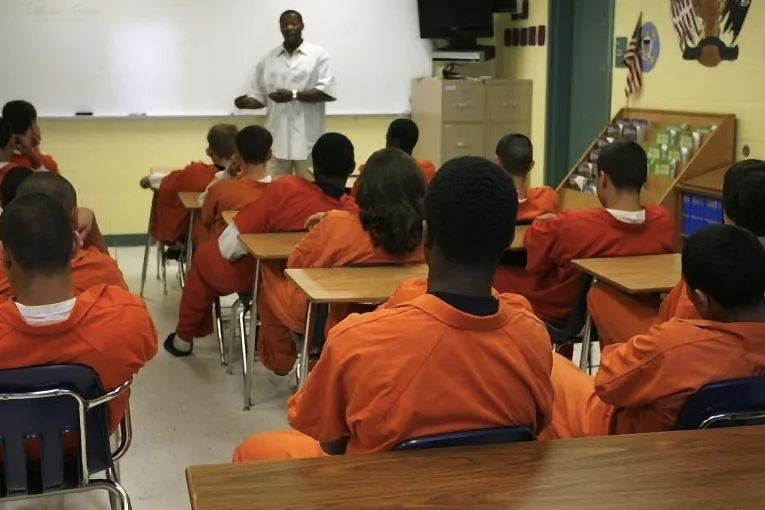
Do enough time in prison and you will develop a keen ability to detect the all-too-familiar stench of apathy wafting downwind from wherever the education classrooms are situated. With few exceptions, prisons are where some of the worst public school teachers go to flex their complete lack of concern for teaching anybody anything and cash out on a cushy retirement package. As peer health educators and mentors, we’ve observed the problem up close for years.
Despite 38% of California’s prison population standing in the functional literacy gap, prison educators have the least incentive to improve the outcomes of their students, and face no consequences for their poor achievement results. Thankfully, the college professors who teach in prisons around the nation delivering higher education courses don’t work for the correctional systems they enter—they travel to and stand in those rooms as exemplars of the humanity prisons were designed to extinguish.
Alice Daniel teaches a Journalism course to Valley State Prison’s (VSP) second cohort of CSU Fresno students working toward their undergraduate degrees. She isn’t just going through the motions either—Daniel is working overtime to bring free-world subject matter experts into her prison classroom. One of her students, a former police officer from Brazil who is now serving a life sentence, described to me how he, along with his classmates, got to meet Jessica Garrison, the author of Devil’s Harvest and the west coast investigations editor of BuzzFeed News, via Zoom in Daniel’s class. “I couldn’t believe anybody out in the free world might care about any of us enough to take the time to connect with our class like that,” he shared. “Jessica was so nice to us. I wasn’t used to that sort of unconditional kindness from a stranger.”
Another of Daniel’s students, a second-generation immigrant who is the first member of his family to attend college, raved to us about meeting poet, author, and journalist Clint Smith via Zoom, saying “this dude is a staff writer for The Atlantic, a Harvard PhD, and he made time for us. Pretty dope.” Few of Daniel’s students knew that the author of How The Word Is Passed and Above Ground previously advocated via a Time.com op-ed for prisoner phone call pricing reform, and even served as the advisor to a Texas high school journalism class. The best teachers are true humanitarians, but in prison, the best teachers are bonafide red-pill equity activists.
VSP’s college professors have a well-earned reputation for curating elevated engagements. We previously wrote about having been invited by CSU Fresno English professor Jesse Scaccia to visit his class to participate in a poetry workshop convened by poet and CSU Fresno English professor Brynn Saito. Merced College’s Rising Scholars English Professor Jennifer McBride also invited us to attend a workshop that featured California’s Poet Laureate performing a reading. There is something special about poets—though every teacher of any discipline commands our respect and gratitude for traveling to and standing in these rooms with us, there is something uniquely different about the wordsmiths. Their empathic capacity to care about our condition, and extend themselves to us, is unmatched. At the intersection of literature and art lives an activist avenger squad few other disciplines can compete with.
Though Daniel’s, Scaccia’s, and McBride’s efforts to elevate their students’ classroom encounters speaks to their collective humanity, it also reflects a culture shift endorsed by the administrative staff at VSP who work to enable those experiences. Gregory Gadams, the Coordinator of Postsecondary Education, has for years overseen the roll out of laptop computers, the emergence of debate team competitions with free-world students, and actively facilitated the normalization of these types of outside-in interactive engagements for students to experience.
Gadams’ boss, VSP’s Principal Sarah Spencer, gave an inspiring commencement speech to college graduates and their families gathered at a recent graduation ceremony. She cited the well-documented recidivism rates that plunge ever lower the more one ascends the collegiate degree ladder of attainment. Academic success results in improved public safety and reincarceration cost savings, while representing a service prisons can offer thanks to federal funding that doesn’t balloon their state budgets. We looked around for our newest Warden—the third in a very short span of time—who, sadly, never bothered to show up for the time-honored graduate handshake moment. We wondered to ourselves: what might have been more important than celebrating the most hard-fought multi-year academic milestones of our community’s most committed over-achievers?
As we took in the graduation and watched the faces of those in attendance, absent was the trace of any apathy. The teachers who stood in that gym for four hours had those authentic smiles you rarely see in prison—proud faces. We didn’t catch anybody staring at their watch or eying the exits. We saw enthusiastic joy, observed teachers warmly shake the hands of their incarcerated students, and noted how relaxing the space was without a bunch of uniforms moving through it. Dare we say, normal?
Here’s to the real ones. Alice Daniel, Gregory Gadams, and Sarah Spencer—we see you.
